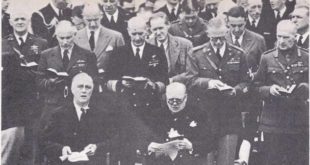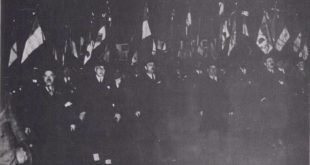So at last, in the Pacific as in Europe, the guns were silent; the nations that had brought so much death and destruction to the world had been defeated, but victory alone was not enough. Governments had to be set up for the defeated nations, the destruction of war had to be repaired, hungry people had to be fed, industry and commerce had to be set in motion. Even more important, a way had to be found to keep war out of the world, to settle disputes between nations by peaceful means rather than by violence. The League of Nations, …
Read More »Victory in the Pacific 1941 – 1945
On June 25, 1940, the Japanese war minister said, “The present international situation is developing in a manner advantageous to Japan’s national policy. We should not miss the present opportunity. . . Japan’s national policy was scarcely a secret. It had already linked itself by treaty to the aggressor nations of Germany and Italy – for several years it had been fighting an undeclared war against China. Although Chinese guerrilla forces were fighting back the Japanese controlled most of the Chinese railroads and held such cities as Peiping, Shanghai and Canton. They planned to establish something they called the “Greater …
Read More »A World at War 1939 – 1941
Now the people of Europe began to hear a new sound, a sound that would haunt them throughout the years of war — the wail and shriek of air-raid sirens. At night, the lights of Europe went out and the “blackout” made familiar streets strange places of darkness. Street lamps were left unlit and windows were covered with heavy draperies. Any stray gleam of light might help guide enemy bombers to their targets. Hurrying about their wartime duties, the people of Britain and France began to wonder. They had not wanted war and yet war had come. Why? What had …
Read More »“Peace in Our Time” 1938 – 1939
Czechoslovakia was a country of many peoples. The largest groups were the Czechs and the Slovaks, but in the region called Sudetenland lived 3,000‚000 Germans. Although Sudetenland had never belonged to Germany — it had once been under the rule of Austria — Hitler was determined to “bring the Sudeten Germans home.” The Nazis had been active in Sudetenland for some time and after Hitler took over Austria they became busier than ever. Throughout the spring and summer of 1938, the Sudeten Germans made demands on the Czech government. In Germany, there were threatening troop movements. Hitler also began the …
Read More »Victory in Europe 1941 – 1945
Even before Pearl Harbour, there had been cooperation between the United States and Britain. In August of 1941, President Roosevelt and Prime Minister Churchill met secretly, on a cruiser at sea off the coast of Newfoundland. There they drew up the Atlantic Charter, a document stating the principles on which they based their hopes for a better future for the world. They pledged that neither country would seek more territory. They hoped that, “after the final destruction of Nazi tyranny,” all men in all lands could “live out their lives in freedom from want and fear,” and they called on …
Read More »“My Name Will Stand Forever” 1933 – 1938
Adolf Hitler, stood above the German town of Berchtesgaden, in a large, imposing house in the mountains and stared out a window. It was a fine February day in the winter of 1938 and the snow-covered peaks of the Alps glistened in the clear air. The man at the window seemed not to see the peaceful mountains. Berchtesgaden was close to the border of Austria and he seemed to see beyond the mountains into the heart of Austria itself — an Austria filled with marching troops‚ cheering crowds and the swastika banners of the Nazis. Staring at this vision, he …
Read More »Totalitarianism Versus Democracy
AS THE 1930’s drew to a close, only eight countries in Europe, besides Great Britain and France, were still democracies. They were Belgium, Holland, Switzerland, Czechoslovakia, Norway, Sweden, Denmark and Finland. Three of Europe’s most important nations were dictatorships. The Soviet Union was communist; Germany and Italy were fascist. There had been dictatorships before, but these went further; they were totalitarian. The word “totalitarian” comes from the word “total,” and total control is what these dictatorships were after — total control of their people, total control of their actions and thought. There were differences between the totalitarian countries. While Stalin …
Read More »Democratic but Divided 1926-1939
UNLIKE Britain, France was not a highly industrialized country; its economy was fairly evenly divided between industry and farming. For this reason, the depression came to France later than it did to any of the democracies and its effect was less severe, but in no other democracy did communists and fascists play so large a part. For a time there was real danger that the French republic would be overthrown by the fascists and there were riots in the streets. One reason the fascists were so dangerous was that the French people were sharply divided in their political opinions. There …
Read More »“On the Dole” 1918 – 1936
IN Europe as in America, the leading democratic nations — Great Britain and France — faced the problems of the great depression. In those nations, too, the question arose: Could democracy survive, or would it give way to totalitarianism? Would the people turn instead to fascism or communism? Although Britain had a brief period of prosperity immediately after World War I, of all the world’s democracies, it was struck hardest and soonest by the depression. For Britain had a special problem. A highly industrialized country, it lived by its exports. It sold manufactured goods and coal to other countries and …
Read More »Roosevelt Battles the Court 1937-1939
BEGINNING his second term, Roosevelt made it plain that the New Deal would go on. He would continue to work for reforms. He said in his second inaugural address: “In this nation I see tens of millions of its citizens — a substantial part of its whole population — who at this very moment are denied the greater part of what the very lowest standards of today call the necessities of life. “I see millions of families trying to live on incomes so meagre that the pall of family disaster hangs over them. “I see millions whose daily lives in …
Read More »








